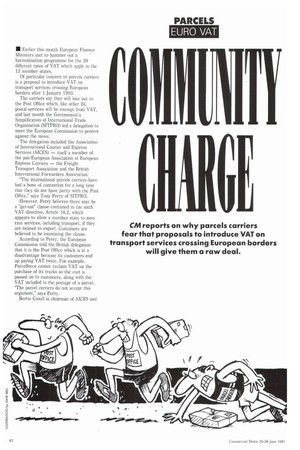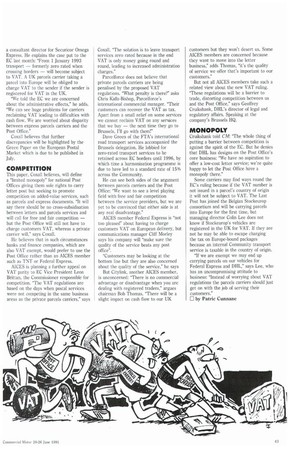CM reports on why parcels carriers fear that proposals to
Page 44

Page 45

If you've noticed an error in this article please click here to report it so we can fix it.
introduce VAT on transport services crossing European borders will give them a raw deal.
IN Earlier this month European Finance Ministers met to hammer out a harmonisation programme for the 39 different rates of VAT which apply in the 12 member states.
Of particular concern to parcels carriers is a proposal to introduce VAT on transport services crossing European borders after 1 January 1993.
The carriers say they will lose out to the Post Office which, like other EC postal services will be exempt from VAT, and last month the Government's Simplification of International Trade Organisation (SITPRO) led a delegation to meet the European Commission to protest against the move.
The delegation included the Association of International Courier and Express Services (AICES) — itself a member of the pan-European Association of European Express Carriers — the Freight Transport Association and the British International Forwarders Association.
"The international parcels carriers have had a bone of contention for a long time that they do not have parity with the Post Office," says Tony Perry of SITPRO.
However, Perry believes there may be a "get-out" clause contained in the sixth VAT directive, Article 16.2, which appears to allow a member state to zero rate services, including transport, if they are related to export. Customers are believed to be examining the clause.
According to Perry, the European Commission told the British delegation that it is the Post Office which is at a disadvantage because its customers end up paying VAT twice. For example, Parcefforce cannot reclaim VAT on the purchase of its trucks so the cost is passed on to customers, along with the VAT included in the postage of a parcel. "The parcel carriers do not accept this argument," says Perry, Bertie Coxall is chairman of AICES and a consultant director for Securicor Omega Express. He explains the case put to the EC last month: "From 1 January 1993 transport — formerly zero rated when crossing borders — will become subject to VAT. A UK parcels carrier taking a parcel into Europe will be obliged to charge VAT to the sender if the sender is registered for VAT in the UK.
"We told the EC we are concerned about the administrative effects," he adds. "We can see huge problems for carriers reclaiming VAT leading to difficulties with cash flow. We are worried about disparity between express parcels carriers and the Post Office."
Coxall believes that further discrepancies will be highlighted by the Green Paper on the European Postal Market which is due to be published in July.
COMPETITION
This paper, Coxall believes, will define a "limited monopoly" for national Post Offices giving them sole rights to carry letter post but seeking to promote competition on added-value services, such as parcels and express documents. "It will say there should be no cross-subsidisation between letters and parcels services and will call for free and fair competition — but the Post Office will still not have to charge customers VAT, whereas a private carrier will," says Coxall.
He believes that in such circumstances banks and finance companies, which are also VAT exempt, would prefer to use the Post Office rather than an AICES member such as TNT or Federal Express.
AICES is planning a further appeal on VAT parity to EC Vice President Leon Brittan, the Commissioner responsible for competition. "The VAT regulations are based on the days when postal services were not competing in the same business areas as the private parcels carriers," says Coxall. "The solution is to leave transport services zero rated because in the end VAT is only money going round and round, leading to increased administration charges."
Parcelforce does not believe that private parcels carriers are being penalised by the proposed VAT regulations. "What penalty is there?" asks Chris KaIla-Bishop, Parcelforce's international commercial manager. "Their customers can recover the VAT as tax. Apart from a small relief on some services we cannot reclaim VAT on any services that we buy — the next time they go to Brussels, I'll go with them!"
Dave Green of the FTA's international road transport services accompanied the Brussels delegation. He lobbied for zero-rated transport services to be retained across EC borders until 1996, by which time a harmonisation programme is due to have led to a standard rate of 15% across the Community.
He can see both sides of the argument between parcels carriers and the Post Office: "We want to see a level playing field with free and fair competition between the service providers, but we are yet to be convinced that either side is at any real disadvantage."
AICES member Federal Express is "not too pleased" about having to charge customers VAT on European delivery, but communications manager Cliff Morley says his company will "make sure the quality of the service beats any post office".
"Customers may be looking at the bottom line but they are also concerned about the quality of the service," he says But Citylink, another AICES member, is unconcerned: "There is no commercial advantage or disadvantage when you are dealing with registered traders," argues chairman Bob Thomas. "There will be a slight impact on cash flow to our UK customers but they won't desert us. Some AICES members are concerned because they want to move into the letter business," adds Thomas, "it's the quality of service we offer that's important to our customers."
But not all AICES members take such a related view about the new VAT ruling. "These regulations will be a barrier to trade, distorting competition between us and the Post Office," says Geoffrey Cruikshank, DHL's director of legal and regulatory affairs. Speaking at the company's Brussels HQ.
MONOPOLY
Cruikshank told CM: "The whole thing of putting a barrier between competition is against the spirit of the EC. But he denies that DHL has designs on the Post Office's core business: "We have no aspiration to offer a low-cost letter service; we're quite happy to let the Post Office have a monopoly there."
Some carriers may find ways round the EC's ruling because if the VAT number is not issued in a parcel's country of origin it will not be subject to VAT. The Last Post has joined the Belgian Stockeurop consortium and will be carrying parcels into Europe for the first time, but managing director Colin Lee does not know if Stockeurop's vehicles are registered in the UK for VAT. If they are not he may be able to escape charging the tax on Europe-bound packages because an internal Community transport service is taxable in the country of origin.
"If we are exempt we may end up carrying parcels on our vehicles for Federal Express and DHL," says Lee, who has an uncompromising attitude to business: "Instead of worrying about VAT regulations the parcels carriers should just get on with the job of serving their customers."
D by Patric Cunnane
























































































